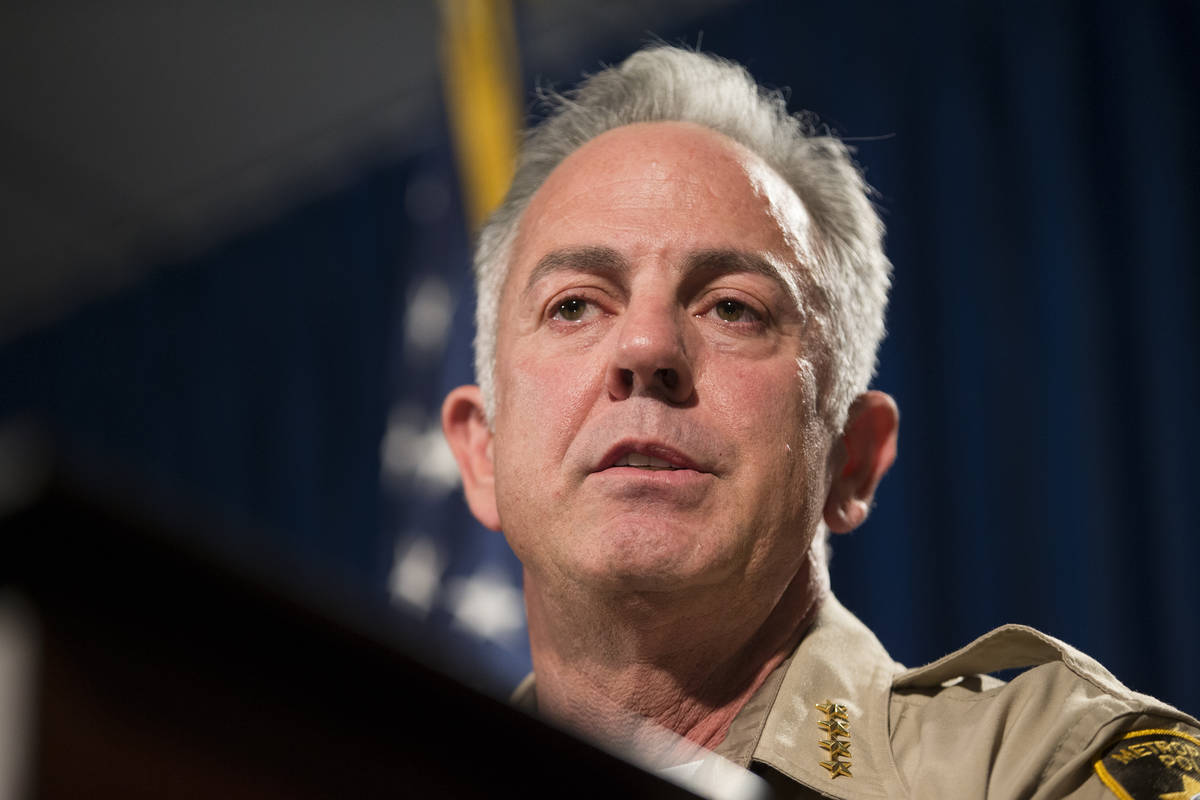George Floyd’s death sparked changes by Las Vegas police
Clark County Sheriff Joe Lombardo said Tuesday that Las Vegas police have made policy changes to prevent tragedies like the death of George Floyd last year, a day after the trial began for the former Minneapolis police officer charged in his killing.
The sheriff spoke at a news conference Tuesday hosted by the Metropolitan Police Department’s multicultural advisory council, which it called to discuss police reform efforts.
In the 11 months since Floyd’s death, Lombardo said the department has removed the lateral vascular neck restraint — a type of chokehold — from its list of approved techniques that can be used to subdue people being taken into police custody.
He also highlighted a policy change requiring officers to render aid to anyone in need and intervene if one of their colleagues is acting inappropriately.
“As you can imagine, with the (Derek) Chauvin trial, there were officers surrounding the primary officer who failed to react,” Lombardo said at the conference. “And we policized that, and it’s considered a serious policy violation if you fail to intervene when you see an inappropriate action occurring.”
Floyd, who was Black, died in Minneapolis police custody on May 25 after he was accused of trying to use a counterfeit $20 bill at a convenience store. Chauvin, 45, who is white, pressed his knee into Floyd’s neck for about 9 minutes and 30 seconds while Floyd stated that he could not breathe.
Chauvin is charged with unintentional second-degree murder, third-degree murder and manslaughter.
Sheriff addresses Gomez case
Video of Floyd’s death that circulated online sparked outrage and protests against racism and police brutality across the U.S. last summer. Several such protests on the Strip and in downtown Las Vegas resulted in chaos and confrontation, with police deploying tear gas and dozens of protesters being taken into custody.
One Black Lives Matter protest in Las Vegas on June 1 ended with the death of Jorge Gomez, whom four Metropolitan Police Department officers shot and killed outside of the Lloyd George U.S. Courthouse amid a protest dispersal order. The officers were not wearing body cameras at the time of the shooting, the department has said.
In the days after the shooting, the department said that officers opened fire at Gomez after he reached for a weapon.
But at a February news briefing in which new video of the shooting was released, attorney Rodolfo Gonzalez, who is part of a team of attorneys representing the Gomez family, said Gomez was acting lawfully to protest police violence.
“He took part in the Black Lives Matter demonstration with guns on his person and a ballistics vest — all in compliance,” he said.
The videos released at the time provided more context to the shooting but, due to the low resolution, did not offer a clear or complete view of Gomez’s actions before the gunfire.
Jeanne Llera, Gomez’s mother, told the Las Vegas Review-Journal that her son was trying to cut through an alley between the Historic Fifth Street School and the Foley Federal Building to get to his car when he encountered the group of officers stationed on the courthouse steps.
“He was just trying to go home,” she has said.
The officers who opened fire on Gomez were placed on paid leave in June pending Metro’s investigation into the shooting, but Lombardo said Tuesday that they had all returned to work. Metro’s part of the investigation has been completed and sent to the Clark County district attorney’s office, who said a public fact-finding review of the case is scheduled for April 16.
Listening to the community
Roxann McCoy, president of the Las Vegas NAACP and a member of the advisory council, said it’s important to acknowledge that Metro has been progressive in its efforts to minimize police brutality, adding that many policies were put in place after Byron Williams’ death in Las Vegas in September 2019, months before George Floyd’s death.
Williams was riding his bicycle without safety lights near Bonanza Road and Martin Luther King Boulevard in the early morning hours of Sept. 5, 2019, and took off from police when they tried to stop him.
After running him down, two officers ordered him to get on the ground on his stomach, and he complied, body camera footage showed.
He repeatedly yelled, “I can’t breathe,” after officers handcuffed him, the video showed. His body went limp, and he died a half hour later at a local hospital. Williams’ death was ruled a homicide.
“With that, we had the opportunity to have a conversation with our sheriff and talk to him about some of the concerns that we noticed in the videos from that in-custody death,” McCoy said.
She added that Williams’ death not only sparked changes in the department’s use of chokeholds, but also changes in officers’ duty to intervene and provide medical attention and appropriate use of force and body cameras. “And as we look at the trial that’s coming up or that’s taking place right now, we will see a lot of those same things that are on trial right now, today.”
According to McCoy and seven other members of the council who spoke at Tuesday’s news conference, Lombardo and Metro have made an effort to listen to the community and honor their opinions. She said Lombardo meets with the council once a month and, while the conversations can sometimes get tense, they always result in a decision made by the department and the community together.
Lombardo said his main priority since taking over as sheriff in 2014 has been to bridge the gap between the community and the police department. He said he knows there is a lack of trust, especially following occurrences of police brutality, but he wants the community to know that their voices are being heard.
“Historically, I think law enforcement tends to push back instead of listen, but here at the LVMPD we’ve changed our mode to a listening mode versus a talking mode,” Lombardo said. “ An important part of listening is you accept the feedback and you do something about it, and I think we’ve done that and effected change.”
Contact Alexis Ford at aford@reviewjournal.com or 702-383-0335. Follow @alexisdford on Twitter.























